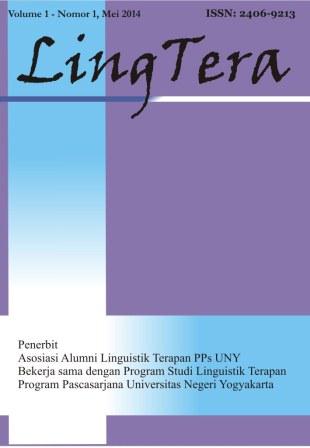Keefektifan strategi REAP dan request dalam pembelajaran membaca pemahaman siswa kelas VIII SMP
DOI:
https://doi.org/10.21831/lt.v3i1.8476Keywords:
effectiveness, REAP strategy, Request strategy, reading comprehensionAbstract
Tujuan penelitian ini yaitu untuk mengidentifikasi perbedaan keefektifan antara penggunaan: (1) strategi REAP dengan strategi tradisional, (2) strategi Request dengan strategi tradisional, dan (3) strategi REAP dengan strategi Request dalam pembelajaran membaca pemahaman siswa Kelas VIII SMP Negeri 2 Herlang. Penelitian ini merupakan penelitian kuasi-eksperimen. Desain eksperimen yang digunakan adalah Randomized Pretest-Posttest Control Group Design. Populasi penelitian adalah seluruh siswa kelas VIII SMP Negeri 2 Herlang. Sampel penelitian ini adalah siswa kelas VIII.2, VIII.3, dan VIII.4 yang ditetapkan dengan menggunakan teknik simple random sampling. Data dianalisis dengan menggunakan Anava dilanjutkan uji Scheffe. Hasil penelitian menunjukkan bahwa ada perbedaan keefektifan dalam pembelajaran dengan strategi REAP, strategi Request, dan tradisional dengan F = 43,315 dan sig.(p)= 0,000 < 0,05. Hasil analisis uji Scheffe secara rinci menunjukan bahwa (1) strategi REAP lebih efektif dibandingkan dengan strategi tradisional, (2) strategi Request lebih efektif dibandingkan dengan strategi tradisional, dan (3) strategi REAP lebih efektif dibandingkan dengan strategi Request dalam pembelajaran membaca pemahaman dengan mean difference sebesar 4,96875 dan sig.(p)= 0,031 < 0,05. Berdasarkan uraian tersebut, dapat disimpulkan bahwa strategi REAP merupakan strategi yang paling efektif dibandingkan dengan strategi Request dan strategi tradisional dalam pembelajaran membaca pemahaman.
Kata Kunci: keefektifan, strategi REAP, strategi Request, membaca pemahaman
The effectiveness of REAP and request strategies in the teaching of reading comprehension to grade VIII students of SMP
Abstract
The purposes of this study are to determine the effectiveness difference: (1) between the REAP strategy and traditional strategy, (2) between the Request strategy and traditional strategy, and (3) in the use of the REAP strategy and Request strategy in the teaching of reading comprehension to grade VIII students of SMP Negeri 2 Herlang. The research was quasi-experimental. The experimental design used was a randomized pretest-posttest control group design. The population was all of the grade VIII students of SMP Negeri 2 Herlang. The sample was students of class VIII.2, VIII.3, and VIII.4 established using the simple random sampling technique. The data were analyzed using the formula of Anava followed by Scheffe test. The result of the research shows that there are differences in teaching effectiveness using the REAP strategy, Request strategy, and traditional strategy with F = 43,315 and sig.(p)= 0,000 ≤ 0,05. The results of the analysis using the Scheffe test show that (1) the REAP strategy is more effective than traditional strategy, (2) the Request strategy is more effective than traditional strategy, (3) the REAP strategy is more effective than Request strategy in teaching reading comprehension, with the mean difference of 4,968 and sig.(p)= 0,031 < 0,05. Based on the above description, it can be concluded that the REAP strategy is the most effective strategy of the three strategies under study in teaching reading comprehension.
Keywords: effectiveness, REAP strategy, Request strategy, reading comprehensionReferences
Abidin, Y. (2010). Strategi membaca: Teori dan pembelajarannya. Bandung: Rizqi Press.
Allen, J. (2004). Tools for teaching content literacy. Diambil pada tanggal 16 Oktober 2012, dari http://www.readingstrategies P514-REAP-20121016.pdf.
Camphell, D.T. & Stanley, J.C. (1996). Experimental and quasi experimental designs for research. Chicago: Rand Menally & Company.
Capello, M. & Moss, B. (2010). Contemporary readings in literary education. California: SAGE Publications, Inc.
Gillet, J.W. & Temple, C. (1986). Understanding reading problems: Assessment and instruction second edition. Boston: Little, Brown and Company.
Kusmiatun, A. (2008). Improvement of reading comprehension and rhetoric speaking skills of elementary school students through mind-mapping strategies. Journal of Education, 1, 1-8.
Lems, K, Miller, L.D, & Soro, T.M. (2010). Teaching reading to english language learners. New York: The Guilford Press.
Mikulecky, B.S & Jeffries, L. (2007). Advanced reading power. New York. Pearson Education.
Miller, D. (2002). Reading with meaning: teaching comprehension in the primary grades. Portland: Stenhouse Publishers.
Nurhadi. (2005). Membaca cepat dan efektif. Bandung: Sinar Baru Algensindo.
Ruddel, M.R. (2005). Teaching content reading and writing. 4th ed. Danvers: John Wiley & Sons.
Soedarsono. (1999). Speed reading: Sistem membaca cepat dan efektif. Jakarta: PT Gramedia Pustaka Utama.
Somandoyo, S. (2011). Strategi dan teknik pembelajaran membaca. Yogyakarta: Graha Ilmu.
Suryaman, M. (2009). Panduan pendidik dalam pembelajaran Bahasa Indonesia SMP/MTs. Jakarta: Pusat Perbukuan Depdiknas.
Tampubolon, D.P. (1987). Kemampuan membaca: Teknik membaca yang efektif dan efisien. Bandung: Angkasa.
Tierney, R.J. (1990). Reading strategies and practices a. compendium third edition. Boston: Allyn and Bacon.
Zuchdi, D. (2008). Strategi meningkatkan kemampuan membaca. Yogyakarta: UNY Press.
Downloads
Published
How to Cite
Issue
Section
Citation Check
License
LingTera allows readers to read, download, copy, distribute, print, search, or link to its articles' full texts and allows readers to use them for any other lawful purpose. The journal allows the author(s) to hold the copyright without restrictions. Finally, the journal allows the author(s) to retain publishing rights without restrictions.
- Authors are allowed to archive their submitted articles in an open-access repository.
- Authors are allowed to archive the final published article in an open-access repository with an acknowledgment of its initial publication in this journal.

Psychology, Evaluation, and Technology in Educational Research is licensed under a Creative Commons Attribution-ShareAlike 4.0 International License.
Based on a work at https://petier.org/index.php/PETIER.










